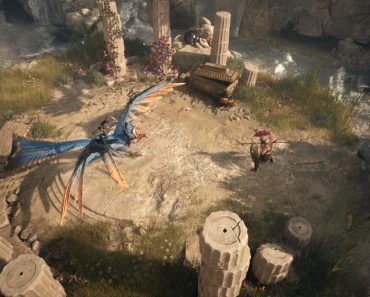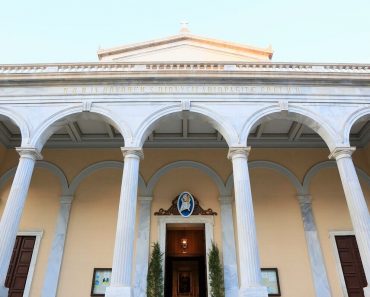On the southwest slope of the Acropolis, the Odeon of Herodes Atticus was built in 161 CE by the wealthy Roman senator Herodes Atticus in memory of his wife, Aspasia Annia Regilla. This grand amphitheatre originally had a wooden roof and could seat up to 5,000 spectators. Today, it remains one of the world’s most striking venues, famed for its impeccable acoustics and the breathtaking fusion of classical architecture and open-air drama beneath the Athenian sky.
Turandot (1, 3, 5, 6, 8 & 9 June)
Puccini’s iconic final opera returns spectacularly to the Herodes Atticus, blending fairy-tale enchantment with dramatic tension. Director Andrei Șerban teams with Chloe Obolensky’s striking designs, under Pier Giorgio Morandi’s baton, presenting a globally acclaimed cast exploring themes of love, vengeance, and forgiveness.
Max Richter (1 July)
Max Richter, the groundbreaking British neoclassical composer, revisits Herodes Atticus for an intimate evening. Joined by a string quintet and narrator, Richter will blend electronic and orchestral sounds, performing selections from his acclaimed albums The Blue Notebooks and In a Landscape.
Sydney Dance Company (7 July)
Australia’s acclaimed Sydney Dance Company delivers Rafael Bonachela’s Impermanence, accompanied by Bryce Dessner’s poignant score performed live by the Zaïde Quartet. A breathtaking exploration of human fragility, Impermanence intertwines contemporary ballet and modern movement with striking athleticism, intensity, and grace.
Mikis Theodorakis – Odysseas Elytis (13 July)
Celebrating Festival’s 70th and Theodorakis’ centennial, Axion Esti, Elytis’ poetic masterpiece set to Theodorakis’ visionary score, returns majestically to Herodes Atticus. George Dalaras and Athens State Orchestra, conducted by Myron Michailidis, promise an emotionally profound evening, paired brilliantly with Kalomiris’ demanding Symphonic Concerto.
Daniil Trifonov (19 July)
Renowned pianist Daniil Trifonov returns to Herodes Atticus, captivating audiences with exceptional artistry. Featuring Tchaikovsky, marking his career triumph; Chopin, central to his celebrated discography; and Barber’s notoriously complex Piano Sonata, Trifonov showcases profound emotional depth and unmatched virtuosity in a deeply memorable recital.
02
Ancient Theatre of Epidaurus
Constructed in the late 4th century BCE by the architect Polykleitos the Younger, the Ancient Theatre of Epidaurus is a masterpiece of classical Greek architecture. With a capacity of approximately 14,000 spectators, it was part of the sanctuary of Asklepios, the god of medicine, reflecting the belief in the healing power of drama. Celebrated for its near-perfect acoustics and symmetry, it continues to serve as the symbolic heart of the Athens Epidaurus Festival, preserving the legacy of ancient Greek tragedy and comedy.
Antigone by Sophocles (27 June)
Ulrich Rasche directs Sophocles’ Antigone at Epidaurus, creating a powerful visual spectacle with Greek actors. Following his acclaimed Agamemnon, Rasche’s radical approach promises a striking premiere, enhancing Epidaurus’ growing reputation for groundbreaking international co-productions. An electrifying opening for the Festival’s 2025 anniversary.
ζ – η – θ The stranger (11 July)
Michail Marmarinos returns to Epidaurus, exploring three Homeric rhapsodies in his unique theatrical style. Following NEKYIA and Trackers, this profound new production delves into the timeless mystery of storytelling, reimagining ancient sources with evocative power, connecting audiences deeply with the roots of drama itself.
Utopia—Teodor Currentzis (19 July)
Charismatic conductor Teodor Currentzis brings Utopia Orchestra to Epidaurus for Mahler’s haunting Symphony No. 4 and poignant Kindertotenlieder. Featuring celebrated sopranos Regula Mühlemann and Eve-Maud Hubeaux, this stirring evening offers an emotional and philosophical journey through Mahler’s profound musical universe.
Europa’s pledge (1 & 2 August)
Celebrated playwright Wajdi Mouawad presents Europa’s pledge at Epidaurus, inspired by ancient drama heroines. This multilingual world premiere, commissioned for the Contemporary Ancients Cycle, explores timeless themes of identity, conflict, and catharsis, making it a standout international co-production and highlight of the Festival.
Oresteia (22 & 23 August)
Theodoros Terzopoulos’ monumental Oresteia returns to Epidaurus, concluding this year’s programme. Praised internationally, this profound philosophical and political performance resonates deeply with audiences, masterfully transcending boundaries through its stunning visual and emotional power, reaffirming the timeless relevance of Aeschylus’ trilogy.
03
Little Theatre of Epidaurus
Built in the 4th century BCE and originally dedicated to Dionysus, the Little Theatre of Epidaurus once served the civic needs of the nearby ancient city. Smaller and more intimate than its larger counterpart, it seats around 2,000 people and was rediscovered and gradually restored starting in 1970. Its modern revival has transformed it into a cherished venue for more experimental and contemporary performances, highlighting the timeless allure of Hellenistic theater.
hēbae Desertae (4 & 5 July)
A poetic folk fable by Kiriakos Haritos, inspired by Antigone and directed by Olia Lazaridou. Blending memory, music, verse, and dream, this lyrical performance shifts through time and tone to conjure a vanished city haunted by language, longing, and fragments of the past.
Electra 7 – A Film (Festival Season) (18 July)
Seven Greek filmmakers reinterpret Sophocles’ Electra in a bold cinematic relay of seven chapters, each marking a decade of the Festival. A landmark Contemporary Ancients production by the Athens Epidaurus Festival and Hellenic Film Academy, merging ancient drama with Greece’s vibrant contemporary cinema scene.
The D Project – Tribute to Piazzolla (9 August)
The D Project, led by Dimitris Dessyllas and joined by Aliki Kayaloglou under Miltos Logiadis’ baton, honours Astor Piazzolla’s legacy in an enchanting concert at Epidaurus. A dynamic encounter between Greek musicians and the dreamlike, passionate world of Nuevo Tango.
Enraptured Night – 100 Years of Mikis Theodorakis (16 August)
Maria Farantouri and Tassis Christoyannis join forces at the Little Theatre of Epidaurus to celebrate Theodorakis’ lyrical legacy. Featuring lesser-known gems from his late works alongside iconic classics, this emotional tribute bridges generations and reaffirms his enduring place in Greece’s cultural soul.
Marina Spanou – The Inner Child (30 August)
Singer-songwriter Marina Spanou returns to her childhood sanctuary—the Little Theatre of Epidaurus—for a confessional musical evening. Blending her original work with timeless theatrical songs, she invites us to meet the Epidaurus within, where memories echo and melodies carry our younger selves back to life, on the last event of the festival at this venue.
04
Piraeus 260
Once an industrial furniture factory in the heart of Athens’ port district, Piraeus 260 has been repurposed into a contemporary cultural venue since the early 2000s. Its raw, post-industrial charm and flexible performance spaces have made it an incubator for avant-garde productions and interdisciplinary works. The site is emblematic of the city’s creative renewal and a key venue during the Athens Epidaurus Festival, reflecting a dynamic blend of past and present.
Théâtre du Soleil: Here Dwell the Dragons (30 June–1 July & 3–5 July)
Marking Théâtre du Soleil’s 60th anniversary, Ariane Mnouchkine presents a sweeping historical epic tracing the roots of totalitarianism from 1917 to today. A chorus of 40 actors, ritual theatre, and Brechtian politics converge in this urgent, poetic resistance to modern despotism.
The Shadow Whose Prey the Hunter Becomes (6 until 8 June)
A searing assembly-meets-performance interrogating AI, identity, and power—led by actors with intellectual disabilities by Back to Back Theatre. Sharp, subversive, and unflinchingly human, this award-winning work challenges what we define as “normal,” asking who gets to speak and be heard in an increasingly mechanised world.
Faye Driscoll – Weathering (27 until 29 June)
Bodies interlock, breathe, and dissolve in a choreography of sound, scent, and touch. Faye Driscoll’s acclaimed Weathering is part ritual, part sculpture, and wholly visceral—an elemental, shape-shifting meditation on ecology, collective form, and how we move through a world that remakes us.
Christos Thanos – War Correspondents (5 until 7 July)
Six figures stand amid history’s rubble, giving voice to war’s enduring scars. Fusing theatre and music, War Correspondents probes truth, trauma, and the power structures behind conflict reporting—raising urgent questions on memory, mediation, and what war really means when it’s made for us.
Het Nationale Theater / ITA Ensemble – The Years (13 & 14 July)
Five women trace a life—and a century—through memory’s shifting lens. In this luminous stage version of Annie Ernaux’s The Years, Eline Arbo conjures postwar Europe and feminist awakening with musicality, intimacy, and sociological force. A triumph of ensemble direction and evocative theatrical storytelling.
Pantelis Makkas – Tenant (5 &until 24 July)
A spectral house of images, Tenant reclaims video as protagonist. Makkas’ immersive installation reframes Euripides, Shakespeare, and Molière through the lens of visual art—unbinding text from theatre to reveal new tensions, textures, and truths. A bold proposal for re-seeing the classical stage.
Other Events
grape
Now in its third year, grape continues to elevate Greek performing arts globally, welcoming over 90 international guests and launching a major partnership with the European Festivals Association to foster global artistic exchange.
Subset Festival
The Subset Festival returns with an expanded international lineup and vibrant programming aimed at younger audiences, spotlighting experimental music, workshops, and commissioned works.
Formidable Women
This year’s Peiraios 260 programme celebrates trailblazing women artists from around the world, showcasing their visionary and diverse contributions to the stage.
Books on Stage Cycle
Eight literary-based productions—three of which are inspired by Nobel laureates—bring powerful contemporary literature to life on stage, exploring deep themes of the human experience.
Roots Cycle
Rooted in Greek tradition and theatrical origins, this cycle revives classic forms and folklore with a modern lens, including August performances dedicated entirely to music.
Anniversary Events at Epidaurus
Four major productions supported by the Stavros Niarchos Foundation, and a new eco-integrated pavilion sponsored by PPC, mark the 70th anniversary of the Festival at Ancient Epidaurus with grand artistic and infrastructural milestones.
Did You Know?
10 Fun Facts About Festival
1
Legendary opera diva Maria Callas first captivated audiences at the Odeon of Herodes Atticus in 1961, marking an unforgettable moment in operatic history.
2
World Famous Stars: From dancers like Rudolph Nureyev and Margot Fonteyn, actors such as Helen Mirren, Juliette Binoche, Ethan Hawke, and Jeremy Irons, and singers like Sting, Elton John, Monserat Caballe, Luciano Pavarotti and Jose Careras have performed at the festival, bridging cinematic fame with ancient drama.
3
A Healing Heritage: The design of the Epidaurus Theatre allows even the softest whisper on stage to be heard clearly in the back rows, a testament to ancient Greek architectural ingenuity that continues to astonish modern acousticians. But the theater isn’t just renowned for its acoustics; it’s part of the Sanctuary of Asclepius, a UNESCO World Heritage site. In ancient times, attending performances here was believed to have therapeutic effects, blending art with healing practices.
4
Political Culture: In 1959, Greek director Karolos Koun’s avant-garde production of Aristophanes’ “The Birds” at Epidaurus, with music by Manos Hadjidakis, faced governmental censorship due to its bold artistic choices, highlighting the festival’s role in challenging societal norms.
5
A Stage for Social Issues: In 1995, choreographer Dimitris Papaioannou, who created magic choreographing the Athens Olympic Games in 2004, staged “A Moment’s Silence” at the (then) Athens Festival. It was groundbreaking, being one of the first Greek stage works to address the AIDS crisis directly, showcasing the festival’s engagement with pressing global issues.
6
When Nature Calls: Performances at the open-air theatres have occasionally been paused due to unexpected natural occurrences, like sudden summer storms or curious wildlife, adding an unpredictable element to the live experience.
7
Reviving Ancient Texts: The festival has been instrumental in bringing lesser-known ancient plays back to life, offering audiences rare glimpses into the breadth of classical Greek drama beyond the commonly performed tragedies.
8
Legendary Composer Mikis Theodorakis premiered iconic works such as “Zorba the Greek” at the festival, creating an enduring global legacy.
9
Educational Outreach: Beyond performances, the festival has initiated workshops and seminars aimed at educating the next generation of artists and audiences, emphasizing its role in cultural education and preservation.
10
Archival Treasures: The festival’s archives house a wealth of materials, from original scripts to costume designs, providing invaluable resources for researchers and historians studying the evolution of performing arts in Greece.







